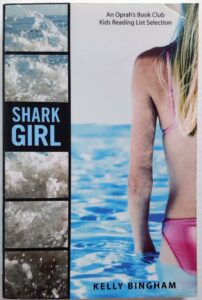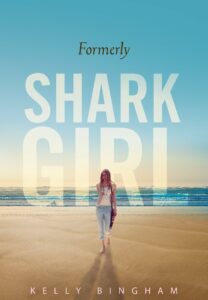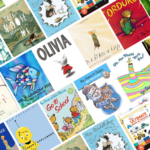We recently interviewed instructor Kelly Bingham on a literary form that is quickly growing in popularity: the young adult poetry novel.
In this discussion, Kelly outlines the strengths and challenges of the young adult poetry novel form, describes her journey through her own poetry novels, and offers advice for anyone interested in poetry novel writing.
Interview: The Young Adult Poetry Novel
Interview Transcript
Please introduce yourself and say a bit about what you do in the writing world.
I’m a children’s author. I have two picture books out: Z is for Moose and Circle, Square, Moose. I have two young adult poetry novels out: Shark Girl and Formerly Shark Girl. I have a master’s in writing for children from Vermont College, and I write and teach.
What is a poetry novel?
A poetry novel is a novel told in poems. These poems don’t have to rhyme or follow a specific format: most poetry novels are written in free verse, which has a lot of freedom to it.
Writing in a poetic form allows the story to be told in small scenes that are very condensed and emotional, and don’t have much of the detail that you might see in a prose novel.
Writing in a poetic form allows the story to be told in small scenes that are very condensed and emotional.
Each scene or moment is a very condensed creation by the writer: it paints a picture rather than giving a lot of detail. The poetry novel is very emotional.
What are the advantages of the form? What does a poetry novel help bring out that a prose novel might not?
There are several advantages. The main one is that you can tell stories of intense suffering and loss without exhausting your reader, because every scene can be very short, straight-to-the-point. You get to the action and the feeling and the reaction and you move on, and your reader doesn’t have to drown in pages and pages of grief.
In a poetry novel, you can tell stories of intense suffering and loss without exhausting your reader.
There’s also something about the poetry form that allows you to get straight into the heart of your character. You have a connection to them, and you don’t have to circumvent anything; you’re right in their head.
Another thing poetry novels do really well is allow you to tell stories in multiple voices, because, again, you’re right in the head of each character.
What have you found to be the difficulties or challenges of the poetry novel?
You don’t have the luxury of going on and on. Sometimes you want to expand your scenes—incorporate a lot of detail or long conversations, have your character think for a long time—but you really can’t do that in a poetry novel very well.
You don’t have the luxury of going on and on.
You have to be very much in tune with your main character when you’re writing. You have to know exactly what they’re thinking, feeling, and doing at every moment.
I also find that there’s a bit of a stigma sometimes attached to poetry novels, and it can be difficult to get past that.
Can you say more about that stigma?
I’ve found that readers love poetry novels. Young adults love them.
People who don’t generally know much about the form tend to look down on poetry novels as a little too economical a form of storytelling that maybe isn’t quite as satisfying as what they’re looking for.
So you can run into a lot of negativity before someone has even opened the book. But the reality is, once these books reach the hands of readers, they love them.
What makes the poetry novel a good fit for young adult fiction?
It lets you get straight to the heart of the character. When you’re writing for young adults, you’re writing about young adults, and I think readers identify with the emotions they see in the characters. They just jump right off the page, immediately.
Poetry novels tend to jump right in. You don’t swim around and build up a story slowly. I think young adults like that.
Poetry novels tend to jump right in. I think young adults like that.
I also think there are a lot of readers out there who are intimidated by long books, lots of pages, and lots of words. Poetry novels allow a reader to read an entire book in a short period of time. I’ve had letters from students and teachers: for some students, that’s the first time they read an entire book on their own.
How did you get interested and involved in young adult poetry novel writing, and how did the Shark Girl books come about?
I was attending Vermont College and getting my master’s in writing. I knew nothing about poetry, and I don’t think I’d ever read a poetry novel.
When I was accepted into the school, we were supposed to come to our first semester with a book in progress. I was living in Los Angeles at the time, and it was summer. It was called the “Summer of the Shark,” because there was a rash of shark attacks around the United States, which is very rare. A little boy got his arm bitten off, and he survived. That story stuck with me. I thought, “That poor little boy, he’s always going to be known as the boy who got his arm bitten off.” He’s not going to have an identity beyond that. What is his life going to be like as he grows up and tries to leave that behind? So I started working on a story from that point of view, but a sixteen-year-old girl character came to mind, and she was very powerful and she wanted the story to be about her, so I started writing the story from her point of view.
I worked on that story for about six months in school with a teacher, and I really wasn’t getting anywhere. And then the second semester we had a special residency based on poetry novels, where some authors came and talked about the form and what it was like, and we had to read a bunch of poetry novels. I really enjoyed them, and a friend said, “Why don’t you try your book in the poetry novel form?” That suggestion really clicked with me, and I just jumped in, and all of a sudden the story just started pouring out of me.
I drafted and drafted, but then I had to back up and spend some time learning about poetry because I didn’t know anything about it. So the next couple of semesters, I studied true poetry, poetry novels, poetic forms and imagery, things like that, and I channeled that all together to write Shark Girl.
Shark Girl was published in 2007. I intended it to be one book by itself—I never planned a sequel—but over the next few years I got so many letters from kids asking for a sequel. It just went on and on, year after year. Nobody lost interest. I finally wrote to my editor and said, “Do you think we should write a sequel?” She said, “Well, maybe. What do you have in mind?”
So I put together a synopsis of what I thought might happen in the sequel. There were several questions readers asked, including a few questions all readers asked, across the board. I thought if I write the book, I’m going to answer those questions. So I based my story around that, sent it off to my editor, and she agreed that we should write it, so I wrote that sequel and here we are.
How was it writing a sequel? Was it challenging to create a second story that’s compelling?
It was definitely difficult. In the first book, she just had her arm bitten off and nearly died. She had to put her life back together. There was quite a bit to work with, and a clear-cut goal: she had to figure out how to go on. With a sequel, what is at stake that’s compelling? What is she reaching for that the reader is invested in?
I left a few loose threads in the first book, so I picked those up, and I looked at the questions my readers wanted answered, and I just started writing. What the readers wanted to know turned out to be just enough to create a compelling story and to create tension. She had some decisions to make, some growing up still to do, her first crush, her first boyfriend, finished high school and got ready to leave home for college. So a lot of coming-of-age things happened, and those turned out to be enough. It was definitely difficult: I was concerned that I would let my readers down and that I’d lost touch with my character, but that all worked out just fine.
When did Formerly Shark Girl come out?
It came out in 2013, so the two books are six years apart.
What other examples of the young adult poetry novel form leap to mind?
The most classic poetry novel is Out of the Dust, which is a middle-grade poetry novel that won the Newbery Prize. That was kind of the beginning of the poetry novel movement, so I always recommend that to people. You can’t find anything better than it—it’s beautifully done, the perfect example of the form.
Long Way Down won the Printz Award a couple of years ago, and that’s a terrific book. Mel Glenn has written several poetry novels that are wonderful, and Karen Hesse, who wrote Out of the Dust, has written other poetry novels.
There’s one called New Found Land about Lewis and Clark, told from multiple points of view. There’s one called The Watch that Ends the Night about the sinking of the Titanic, again told from multiple points of view, including the iceberg and the ship’s rats.
There’s a book, not necessarily for young adults, called October Morning: A Song for Matthew Shepard. It’s a book about the night Matthew Shepard was killed, and it has multiple points of view as well: the fence, the stars, the road, the truck, the doctor, and so on. It’s beautiful, too.
What advice do you have for people who want to write poetry novels, or young adult poetry novels?
My number-one tip is to read as many poetry novels for young adults as you can. Just bury yourself in them, and you will begin to absorb the form that way. There’s more to be done, but that’s the best way to start.
My number-one tip is to read as many poetry novels for young adults as you can.
Look at the ones you like and the ones you don’t, and figure out why, and how you want to apply that to your work.
I would also advise reading classic poets. Mary Oliver, Billy Collins, Spoon River Anthology is a classic poetry that’s centuries old, and that’s a good one to start with there. So my best advice is to read a bunch.
Also, don’t be afraid. Don’t feel you have to be at a certain point before you start drafting—just draft. You can go back later and refine.
Would you like to say anything about your course at Writers.com, “Crafting the Poetry Novel for Young Adults”?
I would welcome all poetry novel writers to come take this class. It’s five weeks, so not a huge time investment—it’s kind of a crash course on everything involved in writing the poetry novel. We’ll talk about what’s at stake, character development, word choice, imagery, and we’ll look at a lot of examples.
I give homework, which is voluntary—I recommend a lot of good books. We have a venue to share work with each other, with our classmates, so you can get group feedback as well as feedback from me.
The class is a way to run your ideas and your writing by a bunch of people, and get some knowledgeable feedback, and get you well on your way to drafting your book. Come give it a try. I think you’ll like it.
Kelly's Upcoming Classes
Crafting the Poetry Novel for Young Adults
May 6th, 2026
Even if you’ve never written poetry before, you can begin the rewarding process of crafting a poetry novel for Young Adults. Is there a market for novels written in verse? Are they well received? Yes, there is, and yes, they are!
Write Your Picture Book!
August 5th, 2026
Picture books have changed greatly over the last few decades, and the market is wide open for fresh ideas. Join us in this six-week intensive where we’ll take that idea of yours and turn it into a manuscript!
Would you like to share any concluding thoughts?
I encourage all writers to read books in your field, attend conferences, take classes, take workshops. Really get yourself out there and build yourself a community of writers.





